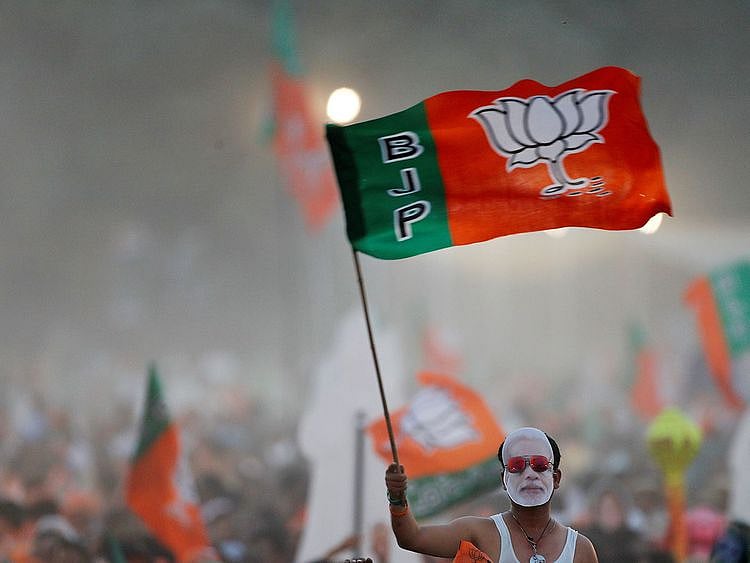It is an unenviable job, being a member of India’s parliament or a state assembly. You represent so many people that you can’t possibly show them your face all the time. Even if you do, there’s only so much you can do for them, because you are not the all-powerful district administration. You are just a lawmaker bound by the party whip.
Add to that the modern czar-like chief ministers of India who make the MLA a non-entity in the power structure. In Uttar Pradesh, where the BJP won a stupendous 312 of 403 MLAs in 2017, some MLAs have sat on protest against their own government.
The result of this mix of factors is that these 312 MLAs have become rather unpopular. That is, to put it mildly.
Anyone but Sangeeta
This writer visited Ghazipur in eastern UP two weeks ago. The city seat, Ghazipur Sadar, has a large population of the Bind community. A poor community categorised as Other Backward Classes, they were happy to see the BJP nominate one of their own as the candidate in 2017. It is by giving representation to such communities that the BJP has become a behemoth in UP.
The candidate in question was Sangeeta Balwant. I went to her own village and found her neighbours in revolt. They showed me her own house and how she had been unable to get basic development work done outside her very own house, leave alone the rest of the village or the constituency. If the BJP were to give her a ticket again, her own community may not vote for her.
The same Bind voters were happy with Modi and Yogi — for free ration if nothing else. The BJP can now give anyone from any community a ticket and win. One wonders if Sangeeta Balwant can save her political career at all after this.
Trouble is, most of the BJP’s 312 MLAs have a similar problem. During Covid lockdowns many weren’t able to help voters directly. When the district administration openly disregards requests from BJP MLAs, how are they to help their voters?
The BJP now has 312 problems at hand. How many of them can it deny a ticket? The more tickets it denies, the more rebellion it faces. They will happily switch over to another party or even fight independently just to make sure the BJP loses the seat.
The Amit Shah formula of managing rebels
Conventional political wisdom has it that political parties should announce the names of candidates well in advance, so that they have time to canvas. We often hear people complain, ‘He was given the ticket on last day of nomination. He hardly had any time to campaign.’ This is often a reason given for Congress doing badly in elections, for instance.
If you notice carefully, even the BJP gives tickets last minute. And wins.
Here is how it works
Suppose there are ten ticket seekers in a constituency. The BJP will take applications from them all. It may include a sitting BJP MLA, a veteran local leader with RSS roots, a rank newcomer, and so on.
The BJP will tell them all that their name is being considered for the constituency and surveys are being carried out. However, they must all campaign hard already to be in the race. It is a bit like a contest. They are all given verifiable tasks and judged on them. They have to campaign for BJP and Modi, and campaign hard. The ticket has to be earned.
If you travel in UP today, you will see cheap flex hoardings everywhere of these ticket seekers publicising the BJP’s “Jan Vishwas Yatra” or the People’s Trust Campaign. The idea is to say people trust the BJP — a way of establishing a sense of pro-incumbency.
In this way, half the BJP campaign in UP right now is being carried out by ticket seekers and on their expense. This is in contrast of the Congress model of making ticket seekers just run around party leaders and offices for lobbying to get tickets. In the Amit Shah model, ticket seekers are put to good use in the campaign.
At the end of this contest, only one person is going to get the ticket. This will be at the eleventh hour, leaving the disgruntled ones little time to switch parties and file nomination against the BJP. Besides, having just campaigned intensely for the BJP for a few weeks, how do they suddenly tell their supporters to not vote for BJP?
The power of zero
This model has worked well for the BJP since 2014. Question is, how many tickets will the BJP cut? The Lucknow rumour is around 150 because a halfway mark is a reasonable guess.
Without offering any speculative number, this writer would like to offer two data points.
One, the BJP in the 2018 Madhya Pradesh elections retained too many unpopular MLAs. It lost.
Two, in the Delhi municipal corporation elections in 2017, the BJP dropped every single sitting councillor. It won.
Let’s see how many of the 312 are going to be lucky in UP.
Network Links
GN StoreDownload our app
© Al Nisr Publishing LLC 2026. All rights reserved.
